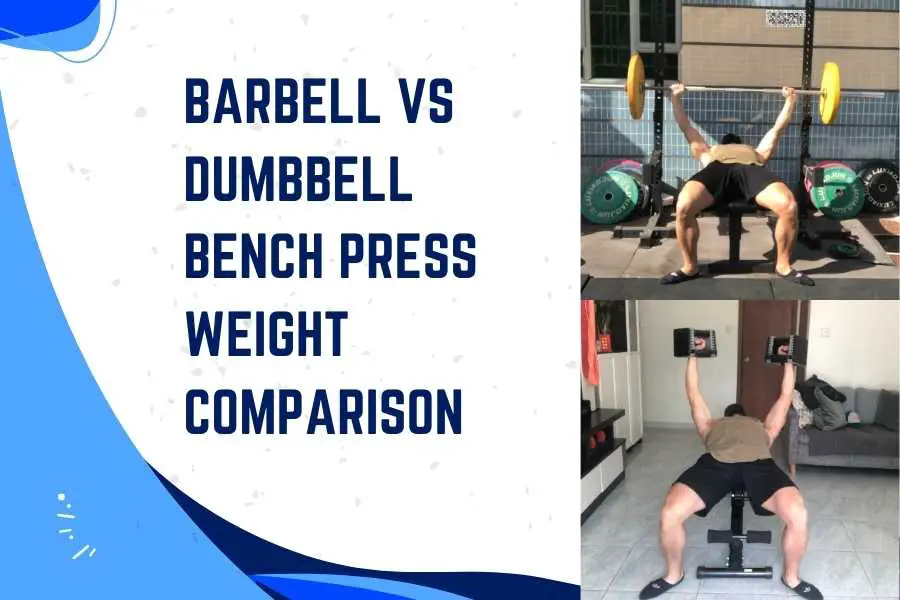While the barbell and dumbbell bench press (also called a chest press) both target the same muscle groups, the weight used can be quite different. This can make it confusing to transition between the two exercises. Below, I share bench press weight conversions for barbell vs dumbbell.
Most lifters can bench press around 20% more weight using a barbell compared to using dumbells. However, the exact weight difference is also influenced by training level and gender.
It doesn’t matter if you’re a seasoned lifter or a complete newbie, my weight comparisons and conversion calculators will help you understand the correct weight ratio between barbells and dumbbells.

- Key Points
- Barbell Vs Dumbbell Bench Press Weight Comparison
- Barbell Vs Dumbbell Bench Press Conversion Calculations
- Example Barbell To Dumbbell Bench Press Weight Conversions
- Example Dumbell To Barbell Bench Press Weight Conversions
- Barbell Vs Dumbbell Bench Press Differences
- Are You Bench Pressing More With Dumbbells Than A Barbell?
- Is It Better To Use A Barbell Or Dumbbells?
- Conclusion
Key Points
- Most people bench press up to 20% more weight using a barbell compared to dumbbells.
- The main reason why more weight can be lifted on the barbell bench press is because it is easier to set up, is more stable, and has a reduced range of motion (ROM) compared to the dumbbell bench press.
- Some people may bench press more with dumbbells due to improper barbell pressing form which can reduce weight lifted, or cheating on the dumbbell press which can increase weight lifted.
Barbell-Dumbbell Bench Press Conversion Calculator
Barbell Vs Dumbbell Bench Press Weight Comparison
The table below shows the typical weight difference between a barbell vs dumbbell bench press according to training level and gender:
| Training Level | Male Barbell Vs Dumbbell Bench Press Weight Difference | Female Barbell Vs Dumbbell Bench Press Weight Difference |
|---|---|---|
| Novice: | 24-26% | 26-30% |
| Intermediate: | 13-19% | 17-18% |
| Advanced: | 6-14% | 8-12% |
| Average: | 16% | 19% |
Here are the training levels defined:
- Novices have up to 6 months of experience bench pressing.
- Intermediates have at least 24 months of experience bench pressing.
- Advanced lifters have at least 4 years of experience bench pressing.
In support of these numbers, a 2011 study found that a group of trained men bench pressed 17% more weight using a barbell compared to using dumbbells.
You can go to my other post to see how much weight you should be lifting on the flat and incline dumbbell bench press.
Barbell Vs Dumbbell Bench Press Conversion Calculations
You can see from the previous table that on average:
- Men can bench press 16% more weight using a barbell compared to dumbbells. This equates to a 0.84 conversion ratio from barbell to dumbbell, or a 1.16 conversion ratio from dumbbell to barbell.
- Women can bench press 19% more weight using a barbell compared to dumbbells. This equates to a 0.81 conversion ratio from barbell to dumbbell, or a 1.19 conversion ratio from dumbbell to barbell.
Based on these ratios, I’ve created a simple weight conversion calculator for you to convert between a barbell and dumbbell bench press.
Bench press weight conversion calculation for men:
- [dumbbell bench press weight] = [barbell bench press weight] x 0.84
- [barbell bench press weight] = [dumbbell bench press weight] x 1.16
Bench press weight conversion calculation for women:
- [dumbbell bench press weight] = [barbell bench press weight] x 0.81
- [barbell bench press weight] = [dumbbell bench press weight] x 1.19
Note: weights include the weight of the barbell and for both dumbbells combined (where applicable).
Example Barbell To Dumbbell Bench Press Weight Conversions
The table below shows a series of example barbell to dumbbell bench press weight conversions based on the calculators given previously. You can see how much less weight you should be able to lift using dumbbells compared to a barbell.
| Barbell Bench Press Weight | Male Dumbbell Weight Equivalent | Female Dumbbell Weight Equivalent |
|---|---|---|
| 10lb / 5kg | 8lb / 4kg | 8lb / 4kg |
| 20lb / 9kg | 17lb / 8kg | 16lb / 7kg |
| 30lb / 14kg | 25lb / 11kg | 24lb / 11kg |
| 40lb / 18kg | 34lb / 15kg | 32lb / 15kg |
| 50lb / 23kg | 42lb / 19kg | 41lb / 18kg |
| 60lb / 27kg | 50lb / 23kg | 49lb / 22kg |
| 70lb / 32kg | 59lb / 26kg | 57lb / 26kg |
| 80lb / 36kg | 67lb / 30kg | 65lb / 29kg |
| 90lb / 41kg | 76lb / 34kg | 73lb / 33kg |
| 100lb / 45kg | 84lb / 38kg | 81lb / 36kg |
| 110lb / 50kg | 92lb / 42kg | 89lb / 40kg |
| 120lb / 54kg | 101lb / 45kg | 97lb / 44kg |
| 130lb / 59kg | 109lb / 49kg | 105lb / 47kg |
| 140lb / 63kg | 118lb / 53kg | 113lb / 51kg |
| 150lb / 68kg | 126lb / 57kg | 122lb / 55kg |
| 160lb / 72kg | 134lb / 60kg | 130lb / 58kg |
| 170lb / 77kg | 143lb / 64kg | 138lb / 62kg |
| 180lb / 81kg | 151lb / 68kg | 146lb / 66kg |
| 190lb / 86kg | 160lb / 72kg | 154lb / 69kg |
| 200lb / 90kg | 168lb / 76kg | 162lb / 73kg |
| 210lb / 95kg | 176lb / 79kg | 170lb / 77kg |
| 220lb / 99kg | 185lb / 83kg | 178lb / 80kg |
| 230lb / 104kg | 193lb / 87kg | 186lb / 84kg |
| 240lb / 108kg | 202lb / 91kg | 194lb / 87kg |
| 250lb / 113kg | 210lb / 95kg | 203lb / 91kg |
| 260lb / 117kg | 218lb / 98kg | 211lb / 95kg |
| 270lb / 122kg | 227lb / 102kg | 219lb / 98kg |
| 280lb / 126kg | 235lb / 106kg | 227lb / 102kg |
| 290lb / 131kg | 244lb / 110kg | 235lb / 106kg |
| 300lb / 135kg | 252lb / 113kg | 243lb / 109kg |
Dumbbell weights are for both dumbbells combined. Barbell weights include the weight of the bar.
You may be interested in my other post to find out the ideal weightload to lift to build msucle.
Example Dumbell To Barbell Bench Press Weight Conversions
The table below shows a series of example dumbbell to barbell bench press weight conversions based on the calculators given previously. You can see how much less weight you should be able to lift using a barbell compared to a dumbbells.
| Dumbbell Bench Press Weight | Male Barbell Weight Equivalent | Female Barbell Weight Equivalent |
|---|---|---|
| 10lb / 5kg | 12lb / 5kg | 12lb / 5kg |
| 20lb / 9kg | 23lb / 10kg | 24lb / 11kg |
| 30lb / 14kg | 35lb / 16kg | 36lb / 16kg |
| 40lb / 18kg | 46lb / 21kg | 48lb / 21kg |
| 50lb / 23kg | 58lb / 26kg | 60lb / 27kg |
| 60lb / 27kg | 70lb / 31kg | 71lb / 32kg |
| 70lb / 32kg | 81lb / 37kg | 83lb / 37kg |
| 80lb / 36kg | 93lb / 42kg | 95lb / 43kg |
| 90lb / 41kg | 104lb / 47kg | 107lb / 48kg |
| 100lb / 45kg | 116lb / 52kg | 119lb / 54kg |
| 110lb / 50kg | 128lb / 57kg | 131lb / 59kg |
| 120lb / 54kg | 139lb / 63kg | 143lb / 64kg |
| 130lb / 59kg | 151lb / 68kg | 155lb / 70kg |
| 140lb / 63kg | 162lb / 73kg | 167lb / 75kg |
| 150lb / 68kg | 174lb / 78kg | 179lb / 80kg |
| 160lb / 72kg | 186lb / 84kg | 190lb / 86kg |
| 170lb / 77kg | 197lb / 89kg | 202lb / 91kg |
| 180lb / 81kg | 209lb / 94kg | 214lb / 96kg |
| 190lb / 86kg | 220lb / 99kg | 226lb / 102kg |
| 200lb / 90kg | 232lb / 104kg | 238lb / 107kg |
| 210lb / 95kg | 244lb / 110kg | 250lb / 112kg |
| 220lb / 99kg | 255lb / 115kg | 262lb / 118kg |
| 230lb / 104kg | 267lb / 120kg | 274lb / 123kg |
| 240lb / 108kg | 278lb / 125kg | 286lb / 129kg |
| 250lb / 113kg | 290lb / 131kg | 298lb / 134kg |
| 260lb / 117kg | 302lb / 136kg | 309lb / 139kg |
| 270lb / 122kg | 313lb / 141kg | 321lb / 145kg |
| 280lb / 126kg | 325lb / 146kg | 333lb / 150kg |
| 290lb / 131kg | 336lb / 151kg | 345lb / 155kg |
| 300lb / 135kg | 348lb / 157kg | 357lb / 161kg |
Dumbbell weights are for both dumbbells combined. Barbell weights include the weight of the bar.
Barbell Vs Dumbbell Bench Press Differences
The equipment used is the main difference between a barbell and dumbbell bench press.
Barbells are long straight bars that are held with both hands and loaded on each side with weight plates. In comparison, dumbbells are handheld weights that are held in each hand.
This translates into perfomance differences that explain why people can generally bench press more weight using a barbell compared to dumbbells (see below).
1) Barbells are more stable compared to dumbbells

Stability plays a critical role in determining how much weight can be lifted on the bench press.
The barbell bench press is a bilateral movement, requiring you to press the same bar with both hands. This allows for a more stable lift since both arms work together to push the weight up. Additionally, it’s easier for the stronger side to compensate for the weaker side in bilateral movements.
In contrast, the dumbbell bench press is a unilateral movement where each hand presses on independent weights. This is a much less stable movement. Much greater stabilizer activity is required from muscles surrounding the chest, arms, and shoulders.
This is one of the main reasons why most people can press more weight using a barbell and why the world’s heaviest bench presses are achieved with barbells.
It’s also why powerlifting (where the objective is to lift maximum weight) mainly focuses on barbell bench press variations.
2) Barbells require less grip strength compared to dumbbells

Grip strength is often overlooked in the bench press. But studies have indicated a correlation between grip strength and upper body strength.
Simply put- how effectively you can grip the weight affects how heavy you can bench press.
With the barbell press, both hands hold the same bar. This distributes and balances the weight evenly, making it easier to control the weight.
In contrast, the weight is unbalanced on the dumbbell press. And this means a higher grip strength is required to control the weight.
This is yet another reason why most people find it easier to bench press more weight using a barbell vs using dumbbells.
3) Barbells require less energy to set up compared to dumbbells

The setup refers to the phase where you get into the bench press starting position in preparation for the lift.
A harder setup requires more energy to execute. And this means less weight can be lifted.
The setup phase is relatively easy in a barbell bench press since the bar is already racked at a fixed height. You simply need to expend a small amount of energy to unrack the barbell. And the consistency in setup makes it easier for you to focus on the lift itself, allowing you to lift more weight.
In comparison, it’s much harder to set up a dumbbell bench press. You need to pick up each dumbbell individually and bring them to the starting position.
This expends a lot of energy since each dumbbell is unbalanced and requires each arm to control the weight independently, especially if you’re trying to press heavy dumbbells.
4) Barbells have less range of motion compared to dumbbells

Bench press range of motion (ROM) describes the distance and direction that your shoulder joint moves during the exercise.
Generally speaking, lifting through a greater ROM is more difficult and allows for less weight to be lifted.
In the barbell bench press, ROM is slightly lower since your hands lock onto a fixed position on the bar and the bar itself travels along a fixed path.
On the other hand, ROM is greater in the dumbbell bench press since your hands move freely along a flexible path.
This means it’s more difficult to control the weight in the dumbbell press compared to the barbell press.
The increased ROM and difficulty are also why bodybuilders often prefer to build a bigger chest using dumbbells rather than a barbell.
Are You Bench Pressing More With Dumbbells Than A Barbell?
Generally speaking, you should be able to bench press more weight using a barbell vs dumbbells.
But you may find the opposite applies to you.
Three reasons why some people can bench press more using dumbbells vs a barbell are:
- Poor barbell pressing form. This can increase shoulder joint discomfort and limit the amount of weight you can lift. Make sure you tuck your elbows in and prevent them from flaring outwards.
- Not considering the weight of the bar. Some beginners forget to account for the fact that an Olympic barbell alone weighs 45lbs/20kg.
- Cheating on the dumbbell press. Beginners commonly do the dumbbell bench press with a partial ROM. This allows more weight to be lifted. The weight comparisons in this post assume you are lifting through a full ROM.
Is It Better To Use A Barbell Or Dumbbells?
Neither is inherently better than the other. Both have their own unique array of benefits.
Barbells are great for lifting maximum weight and for strength-building purposes. Powerlifters often prefer the barbell bench press over using dumbbells.
Dumbbells are effective for maximizing muscle activation and hypertrophy (muscle size gains). Bodybuilders often prefer the dumbbell bench press over using a barbell.
If you’re interested, you can follow each link for a full lowdown on why pros of using each!
Conclusion
Barbell vs dumbbell bench press weight conversions vary according to training level and gender.
But generally speaking, you should be able to bench press up to 20% more weight using a barbell compared to dumbbells.
You can use my weight conversion calculators to calculate a precise comparison!
You may also be interested in the downloadable Kalibre Blueprint PDF which details exactly how I gained 40lbs of lean muscle (it’s 100% free!). It details the exact exercises and nutrition (with printables) I used to go from skinny to ripped!


